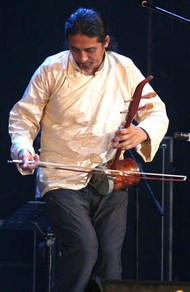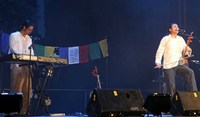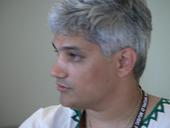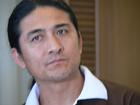Story by Mallika Naguran

Tibetan singer-songwriter Techung plays the piwang
Tibetans in their struggle for freedom from Chinese invasion and occupation of their beautiful Himalayan country can take some comfort in the simple yet compelling music by Techung.
Internationally-acclaimed Tashi Dhondup Sharzur, or Techung as his mom fondly calls him (and so do we), is the gatekeeper of traditional Tibetan musical traditions. Exiled since birth and now living in the San Francisco Bay, Techung mirrors every inch the heart and soul of Tibetan heritage through poetry, song and music.
I was not the only one who stood entranced as he performed in an unassuming quartet on the final leg of the three-day Penang World Music Festival in May 2008 set in the magical quarry gardens of Penang island.
No fancy costumes, no rousing of audience with clichéd greetings and none of the glitzy showmanship expected of someone who is worthy enough to perform alongside artistes such as U2, Herbie Hancock, Pearl Jam, Tracy Chapman and George Harrison.
Techung’s performance was as sincere and simple as his music is.
And downright powerful, hitting the core of consciousness like a bowl of rice chang would. Techung played the Tibetan dranyan (a lute) and piwang (sort of a violin) while he sang, backed up by Brian James Valesco on the keyboards who infuses a bit of jazz, Michel Tyabji on drums and Ralph Rodriguez on bass.
With coal-black, thick hair bunched in a ponytail and well over six feet tall, Techung cuts an impressive figure on and off stage. His dark searching eyes add to his striking good looks as they speak of an unending quest – that of Tibetan freedom.
Techung’s Music
Modestly, in somewhat haltering English sans any American accent, he introduced his music, the meaning behind the lyrics and the motivation for writing them.
His characteristic folksy voice rendered traditional and original compositions comprising Tibetan folk, spiritual songs and freedom anthems that carry messages of love, courage, respect for Mother Nature, non-violence and political freedom.
Rang Zen, a song of Independence, incorporates the voice of the Dalai Lama who warns the danger of Tibetan religion and civilization “dying at the roots”.
Rang Zen
Independence and freedom

Freedom aint gonna be served on a platter, sings Techung
It’s up to Tibetans to make it a fact
Nobody will hand it to us on a platter
Nobody will tell us “Take this, here it is!”
Rang Zen
Total freedom
For that we must all work as one
Techung’s voice filled the breadth of the quarry as his vocals ranged three octaves to send tingling sensations down the spine. For a minute I thought the rocks from the quarry would come hurtling down.
Instead, a soft voice broke the spell. “Tibetan heritage is facing extinction under the Chinese rule and we got to fight on to preserve our identity.”
Growing up in India and later moving on to the States, Techung can’t help feeling a sense of loss. “I live in the US where there’s everything. Yet I feel like I’m losing myself. I think about the people back home in Tibet, the lives they lead and how they lose their freedom and independence,” he told the awe-struck crowd between numbers.
The father of 10-year-old twin girls confides in me that in spite of all, he’s still searching for a place to call home. “Maybe India,” he smiled. “I love it there. It’s close to Tibet as well,” said the peace-loving man who would be arrested if he did venture back to his homeland under the present regime.
Techung’s Life

American Indian percussionist Michel Tyabji loves Tibetan culture
Techung’s parents fled Tibet together with 80,000 others following the Chinese communist government illegal invasion of the country in 1949. Torture, killings even rape were rampant during the resistance. Following the occupation, Chinese authorities infiltrated and attacked every aspect of Tibetan culture and civilization.
Techung was born into this exiled Tibetan community of Dharamsala in India where he later enrolled into the Tibetan Institute of Performing Arts established by the exiled Dalai Lama.
“I am not musically inclined and my family has no artistic background,” he said. Intent on preserving Tibetan heritage though, Techung devoted himself to all aspects of the performing arts at the institute – folk, court and religious music, handed down from the venerated Tibetan elders.
After emigrating to the United States, Techung founded the Chaksampa Tibetan Dance and Opera Company that has performed at spotlight events such as the Smithsonian Folklife Festival in Washington, DC and the Asian Art Museum in San Francisco.
When he’s not performing or recording, this gentle giant trims the bushes of rich people’s houses in San Francisco to earn his keeps. I asked him what makes him write the songs he sings.

Techung wants to play in Tibet before he dies.
“Popular music today seems to focus on physical love and sex. In contrast, through my music, I talk about the Tibetan wisdom that comes from the past and what we can do for future generations,” said the constant gardener.
“My music calls out to unite Tibetans everywhere to stand up for what they believe in.”
Photos by Mallika Naguran and Tourism Malaysia.
Learn more about Tibetan culture by visiting:
www.tibetanarts.org
www.tibet.org (and sign a human rights petition)
www.march10.org
Exclusive to Gaia Discovery Subscribers:
WIN a Techung CD - compilation of Tibetan Folk and Freedom Songs - autographed by award-winning Techung. Winner of the 2006 JPF Asian Album of the Year featuring tracks such as Rang Zen – Independence, Nying Thop – Courage, Zhi Wai Gang Seng – The Snow Lion of Peace and Drechang Silma – Fresh Rice Chang.
How to take part? Just tell us why you think music is important in preserving heritage in Promotions in not more than 100 words. CD goes to the coolest response! Don’t forget to insert your email add else we can’t reach you with a gift parcel. If you’d like to keep your email private, send a personal note to the Editor.
